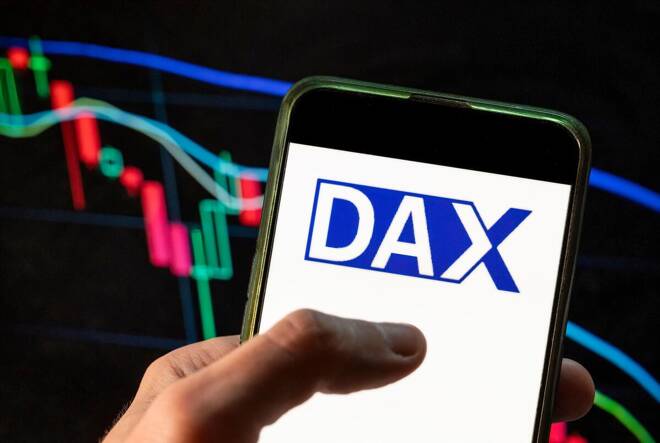Advertisement
Advertisement
DAX Index: US Inflation and Personal Income/Spending in the Spotlight
By:
Hawkish ECB commentary continues to impact investor appetite for DAX-listed stocks. Laster today, the US economic calendar will test dovish Fed bets.
Highlights
- The DAX declined by 0.27% on Thursday, ending the session at 16,687.
- Hawkish ECB commentary left the DAX in negative territory on Thursday.
- On Friday, US personal income/spending and inflation numbers are focal points.
Overview of the DAX Performance on Thursday
The DAX declined by 0.27% on Thursday. Following a 0.07% fall on Wednesday, the DAX ended the Thursday session at 16,687.
Hawkish ECB Comments Impact Buyer Demand for DAX-Listed Stocks
On Thursday, ECB commentary impacted the buyer demand for DAX-listed stocks. ECB Executive Board members poured cold water on H1 2024 rate cut bets. ECB Executive Board member Luis de Guindos said it was too early to discuss interest rate cuts.
This week, ECB Chief Economist Philip Lane and voting members Joachim Nagel and Klaas Knot said it was too early to call victory on inflation.
There were no German or Eurozone economic indicators for investors to consider on Thursday.
US GDP and Manufacturing Numbers Support Bets on a Fed Rate Cut
On Friday, Philly Fed Manufacturing Index and Q3 GDP numbers supported bets on a Q1 2024 Fed rate cut. Revisions to the GDP report included softer-than-expected inflation and a downward revision to consumer spending.
Rising bets on a Q1 2024 Fed rate hike delivered late support for the DAX. However, hawkish ECB chatter countered the influence of the US numbers on the DAX. In contrast, the US equity markets responded to the market-friendly figures.
On Thursday, the Nasdaq Composite Index rallied 1.26%. The Dow and the S&P 500 gained 0.87% and 1.03%, respectively.
The Thursday Market Movers
Commerzbank rallied 1.33% on the ECB approving the bank to buy back up to €600 million worth of shares.
However, auto stocks continued to reverse recent gains. Porsche slid by 1.33%. BMW and Volkswagen saw losses of 0.87% and 1.11%, respectively. Mercedes-Benz Group declined by 0.68%, with Daimler Truck Holding falling by 0.67%.
US Personal Income/Spending and Inflation in the Spotlight
On Friday, US personal income/spending and Core PCE Price Index numbers warrant investor attention. Rising bets on a Q1 2024 Fed rate cut had a limited the impact of hawkish ECB commentary on the DAX. Softer-than-expected US inflation numbers and weaker-than-expected personal income/spending would further raise bets on a Q1 2024 rate cut.
Economists forecast the US Core PCE Price Index to increase by 3.3% in November (Oct: +3.5%). Significantly, economists expect a pickup in personal income and spending. Hotter-than-expected numbers would affect the appetite for riskier assets.
Other stats include durable goods orders, consumer sentiment, and new home sales. However, these may play second fiddle to the personal income/spending and inflation numbers.
Beyond the numbers, investors must consider central bank commentary. Fed comments in reaction to the US economic data need consideration.
The futures markets pointed to a negative start to the Friday session. The DAX and the Nasdaq mini were down 9 and 45 points, respectively.
Short-Term Forecast
Near-term DAX trends remain dependent on ECB commentary. However, sticky US inflation numbers could reduce bets on a Q1 2024 Fed rate cut and further pressure the DAX. In contrast, softer-than-expected US inflation figures could support a DAX return to 17,000.
DAX Technical Indicators
Daily Chart
The DAX remained above the 50-day and 200-day EMAs, with the EMAs affirming bullish price signals.
A DAX move through the 16,750 handle would give the bulls a run at the December 14 ATH 17,003.
The ECB, the Fed, and US inflation will impact market risk sentiment on Friday.
However, a fall below the Thursday low of 16,624 would bring the 16,470 support level into play.
The 14-day RSI reading of 70.09 shows the DAX on the border with overbought territory. Selling pressure may intensify at the 16,750 handle.
4-Hourly Chart
The DAX sat above the 50-day and 200-day EMAs, reaffirming bullish price signals.
A DAX break above the 16,750 handle would support a move toward the December 14 ATH 17,003.
However, a drop below the 16,600 handle would bring the 50-day EMA and 16,470 support level into play.
The 50.30 14-4 hour RSI suggests a DAX move through the 16,850 handle before entering overbought territory.
For a look at the economic events, check out our economic calendar.
About the Author
Bob Masonauthor
With over 28 years of experience in the financial industry, Bob has worked with various global rating agencies and multinational banks. Currently he is covering currencies, commodities, alternative asset classes and global equities, focusing mostly on European and Asian markets.
Advertisement
